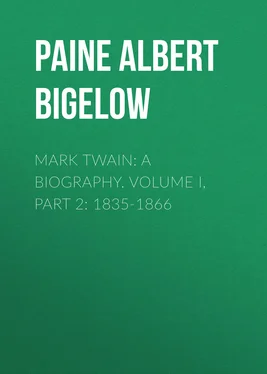Albert Paine - Mark Twain - A Biography. Volume I, Part 2 - 1835-1866
Здесь есть возможность читать онлайн «Albert Paine - Mark Twain - A Biography. Volume I, Part 2 - 1835-1866» — ознакомительный отрывок электронной книги совершенно бесплатно, а после прочтения отрывка купить полную версию. В некоторых случаях можно слушать аудио, скачать через торрент в формате fb2 и присутствует краткое содержание. Жанр: Биографии и Мемуары, foreign_antique, на английском языке. Описание произведения, (предисловие) а так же отзывы посетителей доступны на портале библиотеки ЛибКат.
- Название:Mark Twain: A Biography. Volume I, Part 2: 1835-1866
- Автор:
- Жанр:
- Год:неизвестен
- ISBN:нет данных
- Рейтинг книги:5 / 5. Голосов: 1
-
Избранное:Добавить в избранное
- Отзывы:
-
Ваша оценка:
- 100
- 1
- 2
- 3
- 4
- 5
Mark Twain: A Biography. Volume I, Part 2: 1835-1866: краткое содержание, описание и аннотация
Предлагаем к чтению аннотацию, описание, краткое содержание или предисловие (зависит от того, что написал сам автор книги «Mark Twain: A Biography. Volume I, Part 2: 1835-1866»). Если вы не нашли необходимую информацию о книге — напишите в комментариях, мы постараемся отыскать её.
Mark Twain: A Biography. Volume I, Part 2: 1835-1866 — читать онлайн ознакомительный отрывок
Ниже представлен текст книги, разбитый по страницам. Система сохранения места последней прочитанной страницы, позволяет с удобством читать онлайн бесплатно книгу «Mark Twain: A Biography. Volume I, Part 2: 1835-1866», без необходимости каждый раз заново искать на чём Вы остановились. Поставьте закладку, и сможете в любой момент перейти на страницу, на которой закончили чтение.
Интервал:
Закладка:
Fuller immediately sent out a deluge of complimentary tickets, inviting the school-teachers of New York and Brooklyn, and all the adjacent country, to come free and hear Mark Twain's great lecture on Kanakadom. This was within forty-eight hours of the time he was to appear.
Senator Nye was to have joined Clemens and Fuller at the Westminster, where Clemens was stopping, and they waited for him there with a carriage, fuming and swearing, until it was evident that he was not coming. At last Clemens said:
"Fuller, you've got to introduce me."
"No," suggested Fuller; "I've got a better scheme than that. You get up and begin by bemeaning Nye for not being there. That will be better anyway."
Clemens said:
"Well, Fuller, I can do that. I feel that way. I'll try to think up something fresh and happy to say about that horse-thief."
They drove to Cooper Union with trepidation. Suppose, after all, the school-teachers had declined to come? They went half an hour before the lecture was to begin. Forty years later Mark Twain said:
"I couldn't keep away. I wanted to see that vast Mammoth cave and die. But when we got near the building I saw that all the streets were blocked with people, and that traffic had stopped. I couldn't believe that these people were trying to get into Cooper Institute; but they were, and when I got to the stage at last the house was jammed full-packed; there wasn't room enough left for a child.
"I was happy and I was excited beyond expression. I poured the Sandwich Islands out on those people, and they laughed and shouted to my entire content. For an hour and fifteen minutes I was in paradise."
And Fuller to-day, alive and young, when so many others of that ancient time and event have vanished, has added:
"When Mark appeared the Californians gave a regular yell of welcome. When that was over he walked to the edge of the platform, looked carefully down in the pit, round the edges as if he were hunting for something. Then he said: 'There was to have been a piano here, and a senator to introduce me. I don't seem to discover them anywhere. The piano was a good one, but we will have to get along with such music as I can make with your help. As for the senator—Then Mark let himself go and did as he promised about Senator Nye. He said things that made men from the Pacific coast, who had known Nye, scream with delight. After that came his lecture. The first sentence captured the audience. From that moment to the end it was either in a roar of laughter or half breathless by his beautiful descriptive passages. People were positively ill for days, laughing at that lecture."
So it was a success: everybody was glad to have been there; the papers were kind, congratulations numerous.
–[Kind but not extravagant; those were burning political times, and the doings of mere literary people did not excite the press to the extent of headlines. A jam around Cooper Union to-day, followed by such an artistic triumph, would be a news event. On the other hand, Schuyler Colfax, then Speaker of the House, was reported to the extent of a column, nonpareil. His lecture was of no literary importance, and no echo of it now remains. But those were political, not artistic, days.
Of Mark Twain's lecture the Times notice said:
"Nearly every one present came prepared for considerable provocation for enjoyable laughter, and from the appearance of their mirthful faces leaving the hall at the conclusion of the lecture but few were disappointed, and it is not too much to say that seldom has so large an audience been so uniformly pleased as the one that listened to Mark Twain's quaint remarks last evening. The large hall of the Union was filled to its utmost capacity by fully two thousand persons, which fact spoke well for the reputation of the lecturer and his future success. Mark Twain's style is a quaint one both in manner and method, and through his discourse he managed to keep on the right side of the audience, and frequently convulsed it with hearty laughter…. During a description of the topography of the Sandwich Islands the lecturer surprised his hearers by a graphic and eloquent description of the eruption of the great volcano, which occurred in 1840, and his language was loudly applauded.
"Judging from the success achieved by the lecturer last evening, he should repeat his experiment at an early date."]
Mark Twain always felt grateful to the school-teachers for that night. Many years later, when they wanted him to read to them in Steinway Hall, he gladly gave his services without charge.
Nor was the lecture a complete financial failure. In spite of the flood of complementaries, there was a cash return of some three hundred dollars from the sale of tickets—a substantial aid in defraying the expenses which Fuller assumed and insisted on making good on his own account. That was Fuller's regal way; his return lay in the joy of the game, and in the winning of the larger stake for a friend.
"Mark," he said, "it is all right. The fortune didn't come, but it will. The fame has arrived; with this lecture and your book just out you are going to be the most talked-of man in the country. Your letters for the Alta and the Tribune will get the widest reception of any letters of travel ever written."
LIX
THE FIRST BOOK
With the shadow of the Cooper Institute so happily dispelled, The Celebrated Jumping Frog of Calaveras County, and his following of Other Sketches, became a matter of more interest. The book was a neat blue-and-gold volume printed by John A. Gray & Green, the old firm for which the boy, Sam Clemens, had set type thirteen years before. The title-page bore Webb's name as publisher, with the American News Company as selling agents. It further stated that the book was edited by "John Paul," that is to say by Webb himself. The dedication was in keeping with the general irresponsible character of the venture. It was as follows:
TO JOHN SMITH WHOM I HAVE KNOWN IN DIVERS AND SUNDRY PLACES ABOUT THE WORLD, AND WHOSE MANY AND MANIFOLD VIRTUES DID ALWAYS COMMAND MY ESTEEM, I DEDICATE THIS BOOK
It is said that the man to whom a volume is dedicated always buys a copy.
If this prove true in the present instance, a princely affluence is about to burst upon
THE AUTHOR.The "advertisement" stated that the author had "scaled the heights of popularity at a single jump, and won for himself the sobriquet of the 'Wild Humorist of the Pacific Slope'; furthermore, that he was known to fame as the 'Moralist of the Main,'" and that as such he would be likely to go down to posterity, adding that it was in his secondary character, as humorist, rather than in his primal one of moralist, that the volume aimed to present him.—[The advertisement complete, with extracts from the book, may be found under Appendix E, at the end of last volume.]
Every little while, during the forty years or more that have elapsed since then, some one has come forward announcing Mark Twain to be as much a philosopher as a humorist, as if this were a new discovery. But it was a discovery chiefly to the person making the announcement. Every one who ever knew Mark Twain at any period of his life made the same discovery. Every one who ever took the trouble to familiarize himself with his work made it. Those who did not make it have known his work only by hearsay and quotation, or they have read it very casually, or have been very dull. It would be much more of a discovery to find a book in which he has not been serious—a philosopher, a moralist, and a poet. Even in the Jumping Frog sketches, selected particularly for their inconsequence, the under-vein of reflection and purpose is not lacking. The answer to Moral Statistician—[In "Answers to Correspondents," included now in Sketches New and Old. An extract from it, and from "A Strange Dream," will be found in Appendix E.]—is fairly alive with human wisdom and righteous wrath. The "Strange Dream," though ending in a joke, is aglow with poetry. Webb's "advertisement" was playfully written, but it was earnestly intended, and he writes Mark Twain down a moralist—not as a discovery, but as a matter of course. The discoveries came along later, when the author's fame as a humorist had dazzled the nations.
Читать дальшеИнтервал:
Закладка:
Похожие книги на «Mark Twain: A Biography. Volume I, Part 2: 1835-1866»
Представляем Вашему вниманию похожие книги на «Mark Twain: A Biography. Volume I, Part 2: 1835-1866» списком для выбора. Мы отобрали схожую по названию и смыслу литературу в надежде предоставить читателям больше вариантов отыскать новые, интересные, ещё непрочитанные произведения.
Обсуждение, отзывы о книге «Mark Twain: A Biography. Volume I, Part 2: 1835-1866» и просто собственные мнения читателей. Оставьте ваши комментарии, напишите, что Вы думаете о произведении, его смысле или главных героях. Укажите что конкретно понравилось, а что нет, и почему Вы так считаете.












